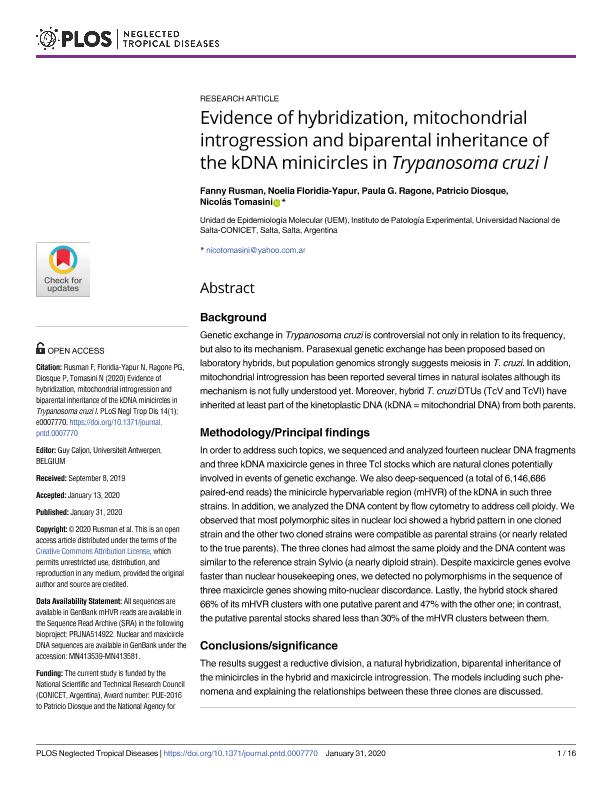Mostrar el registro sencillo del ítem
dc.contributor.author
Rusman, Fanny

dc.contributor.author
Floridia Yapur, Noelia Aldana del Rosario

dc.contributor.author
Ragone, Paula Gabriela

dc.contributor.author
Diosque, Patricio

dc.contributor.author
Tomasini, Nicolás

dc.date.available
2020-12-15T21:02:24Z
dc.date.issued
2020-01
dc.identifier.citation
Rusman, Fanny; Floridia Yapur, Noelia Aldana del Rosario; Ragone, Paula Gabriela; Diosque, Patricio; Tomasini, Nicolás; Evidence of hybridization, mitochondrial introgression and biparental inheritance of the kdna minicircles in trypanosoma cruzi i; Public Library of Science; PLoS Neglected Tropical Diseases; 14; 1; 1-2020; 1-16
dc.identifier.issn
1935-2735
dc.identifier.uri
http://hdl.handle.net/11336/120538
dc.description.abstract
Background Genetic exchange in Trypanosoma cruzi is controversial not only in relation to its frequency, but also to its mechanism. Parasexual genetic exchange has been proposed based on laboratory hybrids, but population genomics strongly suggests meiosis in T. cruzi. In addition, mitochondrial introgression has been reported several times in natural isolates although its mechanism is not fully understood yet. Moreover, hybrid T. cruzi DTUs (TcV and TcVI) have inherited at least part of the kinetoplastic DNA (kDNA = mitochondrial DNA) from both parents. Methodology/Principal findings In order to address such topics, we sequenced and analyzed fourteen nuclear DNA fragments and three kDNA maxicircle genes in three TcI stocks which are natural clones potentially involved in events of genetic exchange. We also deep-sequenced (a total of 6,146,686 paired-end reads) the minicircle hypervariable region (mHVR) of the kDNA in such three strains. In addition, we analyzed the DNA content by flow cytometry to address cell ploidy. We observed that most polymorphic sites in nuclear loci showed a hybrid pattern in one cloned strain and the other two cloned strains were compatible as parental strains (or nearly related to the true parents). The three clones had almost the same ploidy and the DNA content was similar to the reference strain Sylvio (a nearly diploid strain). Despite maxicircle genes evolve faster than nuclear housekeeping ones, we detected no polymorphisms in the sequence of three maxicircle genes showing mito-nuclear discordance. Lastly, the hybrid stock shared 66% of its mHVR clusters with one putative parent and 47% with the other one; in contrast, the putative parental stocks shared less than 30% of the mHVR clusters between them. Conclusions/significance The results suggest a reductive division, a natural hybridization, biparental inheritance of the minicircles in the hybrid and maxicircle introgression. The models including such phe-nomena and explaining the relationships between these three clones are discussed.
dc.format
application/pdf
dc.language.iso
eng
dc.publisher
Public Library of Science

dc.rights
info:eu-repo/semantics/openAccess
dc.rights.uri
https://creativecommons.org/licenses/by-nc-sa/2.5/ar/
dc.subject
TRYPANOSOMA CRUZI
dc.subject
TCI
dc.subject
KDNA
dc.subject
BIPARENTAL INHERITANCE
dc.subject
HYBRIDIZATION
dc.subject
MITOCHONDRIAL INTROGRESSION
dc.subject.classification
Bioquímica y Biología Molecular

dc.subject.classification
Ciencias Biológicas

dc.subject.classification
CIENCIAS NATURALES Y EXACTAS

dc.title
Evidence of hybridization, mitochondrial introgression and biparental inheritance of the kdna minicircles in trypanosoma cruzi i
dc.type
info:eu-repo/semantics/article
dc.type
info:ar-repo/semantics/artículo
dc.type
info:eu-repo/semantics/publishedVersion
dc.date.updated
2020-05-19T19:39:26Z
dc.journal.volume
14
dc.journal.number
1
dc.journal.pagination
1-16
dc.journal.pais
Estados Unidos

dc.description.fil
Fil: Rusman, Fanny. Consejo Nacional de Investigaciones Científicas y Técnicas. Centro Científico Tecnológico Conicet - Salta. Instituto de Patología Experimental. Universidad Nacional de Salta. Facultad de Ciencias de la Salud. Instituto de Patología Experimental; Argentina
dc.description.fil
Fil: Floridia Yapur, Noelia Aldana del Rosario. Consejo Nacional de Investigaciones Científicas y Técnicas. Centro Científico Tecnológico Conicet - Salta. Instituto de Patología Experimental. Universidad Nacional de Salta. Facultad de Ciencias de la Salud. Instituto de Patología Experimental; Argentina
dc.description.fil
Fil: Ragone, Paula Gabriela. Consejo Nacional de Investigaciones Científicas y Técnicas. Centro Científico Tecnológico Conicet - Salta. Instituto de Patología Experimental. Universidad Nacional de Salta. Facultad de Ciencias de la Salud. Instituto de Patología Experimental; Argentina
dc.description.fil
Fil: Diosque, Patricio. Consejo Nacional de Investigaciones Científicas y Técnicas. Centro Científico Tecnológico Conicet - Salta. Instituto de Patología Experimental. Universidad Nacional de Salta. Facultad de Ciencias de la Salud. Instituto de Patología Experimental; Argentina
dc.description.fil
Fil: Tomasini, Nicolás. Consejo Nacional de Investigaciones Científicas y Técnicas. Centro Científico Tecnológico Conicet - Salta. Instituto de Patología Experimental. Universidad Nacional de Salta. Facultad de Ciencias de la Salud. Instituto de Patología Experimental; Argentina
dc.journal.title
PLoS Neglected Tropical Diseases

dc.relation.alternativeid
info:eu-repo/semantics/altIdentifier/url/https://dx.plos.org/10.1371/journal.pntd.0007770
dc.relation.alternativeid
info:eu-repo/semantics/altIdentifier/doi/http://dx.doi.org/10.1371/journal.pntd.0007770
Archivos asociados
